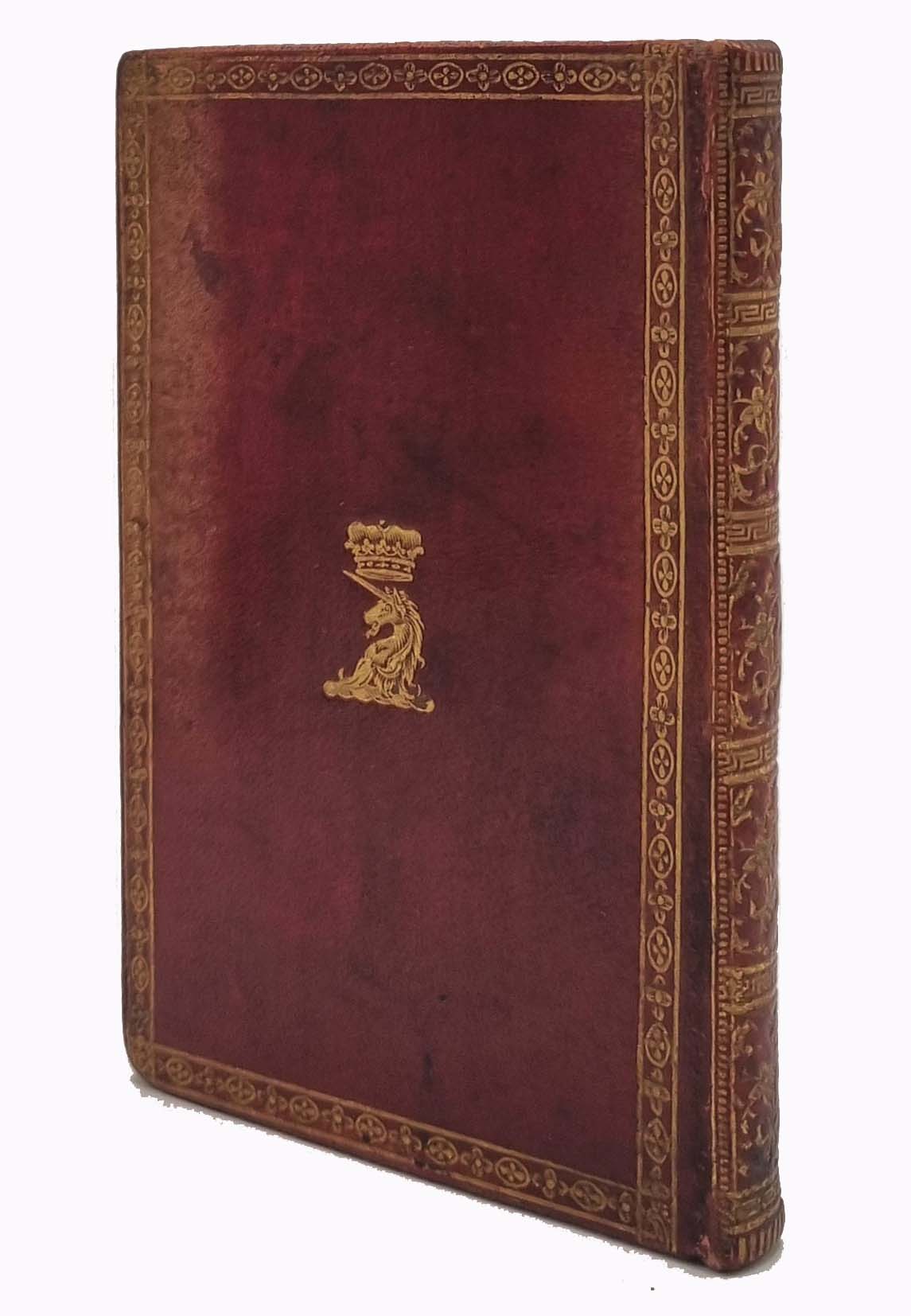POSTEL, Guillaume.
THE ROXBURGHE COPY
Liber de causis seu de principiis et originibus naturae.
Paris, apud Sebastianum Nivellium, 1552£4,950.00
FIRST EDITION. 16mo, 36 unnumbered ll., A-D8 E4. Roman letter, occasional Italic or Greek. T-p margins a little thumb soiled, light yellowing. A very good, clean copy in C18 crimson morocco, marbled endpapers, bordered with gilt floral roll, gilt armorial centrepiece of John Ker, 3rd Duke of Roxburghe to covers, spine gilt to a design of fleurons and Greek fillets, all edges gilt to a floral motif, scattered ink splashes to covers, outer margin of lower faded. ‘CP’ and pencilled Roxburghe lot number and price to verso of ffep, occasional early underlining.
Exquisitely bound copy of the scarce first edition of this important work. Formerly in the library of the great bibliophile and collector, John Ker, 3rd Duke of Roxburghe, whose remarkable library was sold in 1812. ‘The sale […] was a most sensational affair and the total of £23,342 was an extraordinary one at the time […] The Roxburghe Club was inaugurated in commemoration […]’ (de Ricci). This lot 623 sold for £8 6s to Money. The library was known to include important and scarce books on magic and mysticism; Gilbert Norrell, a key figure in the C19 Revival of English Magic, acquired several books at the sale. The compiler of the catalogue wrote: ‘there is one class of books […], among which there are some very rare ones, that were not purchased by the late Possessor [the 3rd Duke]. They were collected early in the late century, when free-thinking was much the fashion. William Postel, Giordano Bruno, or Benedict Spinosa, could be no favourites with the late Proprietor, who only valued philosophical writers, in proportion as they improved the morals of mankind’ (‘Catalogue’, I, 16-17).
Guillaume Postel (1510-81), scholar, cosmographer, cartographer and diplomat, had a remarkable knowledge of classical languages as well as Arabic, Syriac and Hebrew. He also provided some of the earliest translations of the Hebrew ‘Zohar’ and ‘Bahir’. In the mid-1540s, in Venice, he became the confessor of Mother Zuana, a mystic from the populace allegedly conversant in ancient religious mysteries, who greatly influenced his views towards millenarianism; for these heretical opinions he was condemned by the Inquisition and imprisoned in Rome. A brief but dense essay on cosmography, ‘Liber’ discusses the causes, principles and nature of things, and reprises the title of the namesake pseudo-Aristotelian work on ‘the pure good’. Postel criticised Aristotelianism when it went against either divine law or reason. He was especially opposed to Scholastic distortions of Aristotle, whose true thought consequently ‘lay neglected’, and even called Averroes, who influenced the Scholastics, an ‘enemy of providence’. In his alternative, syncretic view, Postel equated Aristotle’s Active Intellect, which oversaw the terrestrial sphere, ‘with the Platonic concept of the World Spirit, with the creative force of the universe, and the person of Jesus’ (Petry, 55). Postel’s idiosyncratic ideas on natural philosophy, theology, mysticism and eschatology were very influential for early modern occultism.
Only Newberry copy recorded in the US.Caillet III, 8898; BM STC Fr., p.364; Brunet IV, 836; French Books 83778. A catalogue of the library of...John duke of Roxburghe (1812); Y. Petry, Gender, Kabbalah, and the Reformation (Leiden, 2004).In stock







